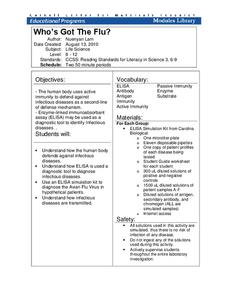Virginia Department of Education
The Germ Theory and Koch’s Postulates
Explore the history of cholera and its effect on society with your biology class. Young biologists will then proceed to grow their own germs, prepared from live cultures, and follow the steps of the scientific method to generate data....
Cornell University
Who’s Got The Flu?
Become an immunologist for the day. Scholars elicit the use of the enzyme-linked immunoabsorbent assay (ELISA) to diagnose an infectious disease. Through the process, they learn about the immune system response to infectious diseases.
Curated OER
Are you an Animal Sleuth?
Young scholars define and identify both wild and domestic animals as well as mammals and non-mammals. In this animal safety lesson, students distinguish between animals that can carry rabies from those that cannot. Young scholars use...
Curated OER
Social Studies: The Human and Animal Connection!
Students infer the connection among humans, animals, and disease through the interpretation of concept maps. They are introduced to the idea of a connection human disease and the domestication of animals.
Curated OER
What Keeps Your Mouth Healthy?
Students dramatize the oral disease process caused by bacteria which leads to tooth decay.
Curated OER
Animal Electronic I.D.
Students discover ways to keep the animals in our environment safe by examining electronic I.D. tags. In this animal safety lesson, students participate in a role-playing activity in which they are monitored by an electronic I.D. tag. ...
Curated OER
What is Wrong with My Pet? - An Introduction to Zoonoses
Learners describe how ringworm and roundworm cause diseases in both humans and animals. In this life science lesson, students research how these diseases can be transmitted. They create an information brochure to promote public awareness...
Curated OER
1928 Flu
Young scholars state the some diseases are the result of infection. They describe the risks associated with biological hazards, such as viruses. Pupils name ways that infectious disease can be prevented, controlled, or cured. Students...
Centers for Disease Control and Prevention
Learning about Giardia and Giardiasis - Research and Role Play
Young biologists begin researching giardia and completing an epidemiologic triangle. They then portray either a parent of a sick child or a physician in a fun role play activity.
Curated OER
Pets and People
Students discuss the pros and cons of having household pets. For this health lesson, students identify different types of diseases they can get from pets. They evaluate their pet interactions and suggest ways to modify health habits...
Curated OER
Nutrition
Students create a video incorporating clay animation and skits. Using their video creation, students explain and explore the five basic food groups, nutrition news, nutrients, benefits and food examples. They maintain a food journal,...
Curated OER
How Germs Spread
Students conduct a test to help them visualize the spread of
germs. They identify that a pandemic is an epidemic (an outbreak of an infectious disease) that spreads across a large region or even worldwide. Finally, students state...
Curated OER
Sample Activity From The Water Sourcebook
Students explore septic system failures and contamination of groundwater. The complete a worksheet to explore the basic parts of a septic system. In a lab situation, students simulate a septic system failure. They explore coliform...
Curated OER
Hand Washing
Mostly discussion, this lesson explores the importance and methods of hand washing. A few true stories of community illnesses spread by the neglect of washing hands serve as an anticipatory set. The activity is most memorable if you are...
Curated OER
Stop the Bleeding
Students explore various parts of the heart and blood vessels . They begin with an overview of the components of the cardiovascular system. They see a cross section of an artery and watch how a blood clot develops.
Curated OER
Evolving Resistance
Students examine antibiotic overuse and the evolution of antibiotic resistance in bacteria.
Curated OER
Scales, Scutes, and Skins
Students identify the various adaptations of reptiles and amphibians. After distinguishing between reptiles and amphibians, students discuss the ways in which their adaptations aid in their survival. They participate in a hands on...
Curated OER
Cranes, Crosswalks, and Big Gulps
Young scholars watch a video and answer questions based on wildlife jobs. In this wildlife lesson plan, students learn that biologists don't just play with animals but that there is a lot of study involved.
Curated OER
Mussel Movements
Young scholars consider the impact of invasive species on local environments. In this ecology lesson plan, watch the video, Arizona Wildlife Views, which focuses on invasive species. Students develop vocabulary, relate to meaningful...




















